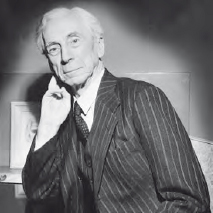Analytic PhilosophyBertrand Russell |
Who was Bertrand Russell? |
Arthur William Bertrand Third Earl Russell (1872–1970), who was known to his friends as “Bertie,” is hailed as the founder of analytic philosophy, along with G.E. Moore (1873–1958) and Ludwig Wittgenstein(1889–1951). He studied and lectured at Cambridge University, losing his position there between 1916 and 1944 because of his pacifist views and activism. He won the Nobel Prize in 1950. His writings on philosophical, political, scientific, and social reform topics are all in beautifully executed prose, which he was said to have been able to compose from the first draft.
Russell is now best known for his failed attempt with Alfred North Whitehead (1861–1947) to reduce mathematics to logic, his theory of descriptions, his theory of types, and his ruling doctrine that the work of philosophy is to analyze propositions (the meanings of sentences) and that the only propositions worthy of such analysis must have “constituents” with which we are acquainted (have direct knowledge of).
Russell was one of the most productive philosophical authors of all time. He published hundreds of articles and essays and scores of books. Among the most noteworthy are “On Denoting,” Mind (Vol. 14, 1905); Philosophical Essays (1910); The Problems of Philosophy (1912); Principia Mathematica, with Alfred North Whitehead, three volumes (1910–1913); Why I am Not a Christian (1927); A History of Western Philosophy and Its Connection with Political and Social Circumstances from the Earliest Times to the Present Day (1946); and The Autobiography of Bertrand Russell (1967–1969).

